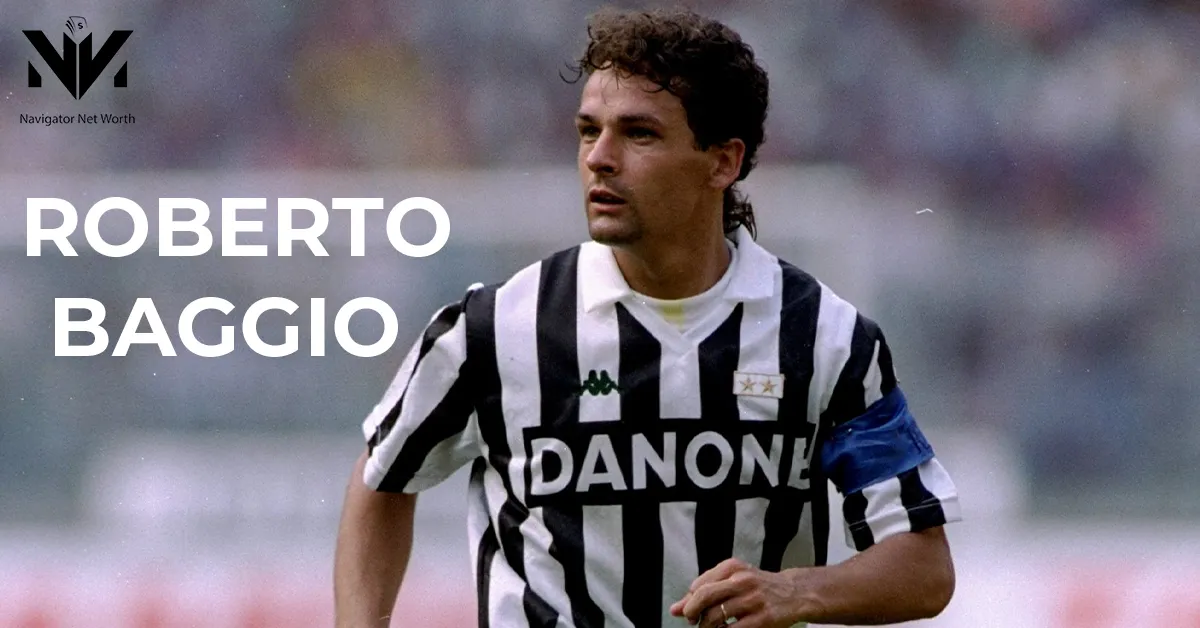Roberto Baggio is a retired Italian professional footballer who played as an attacking midfielder. He is widely regarded as one of the greatest players of his generation, and is known for his dribbling skills, passing ability, and goalscoring prowess. Roberto Baggio Net Worth In 2024 is estimated to be around $40 million.
Roberto Baggio Early Life
Roberto Baggio, the legendary Italian footballer nicknamed “Il Divin Codino” (The Divine Ponytail), had an early life steeped in both hardship and extraordinary talent. Born in 1967 in the small town of Caldogno, Veneto, Italy, Baggio was the sixth of eight children in a working-class family. His father, Fiorindo, worked at a ceramic factory, while his mother, Matilde, raised the large brood.
Despite the family’s struggles, Roberto found solace and escape in football. His precocious talent was evident from a young age. At just nine years old, he was already playing for his local youth team, Caldogno. By the time he was 11, he had scored a staggering 45 goals and provided 20 assists in just 26 games, even netting six goals in a single match!
Baggio’s exceptional abilities caught the eye of scout Antonio Mora, who brought him to the Vicenza youth team at the tender age of 13. There, his skill continued to blossom, and he scored an impressive 110 goals in 120 matches. This remarkable performance paved the way for his professional debut with Vicenza’s senior side in 1983, at the young age of 15.
Roberto Baggio’s early life was a testament to his unwavering passion for football, his natural talent, and his ability to overcome challenges. From his humble beginnings in Caldogno to his meteoric rise in the Vicenza youth system, Baggio’s journey laid the foundation for an extraordinary career that would see him become one of Italy’s greatest footballing legends.
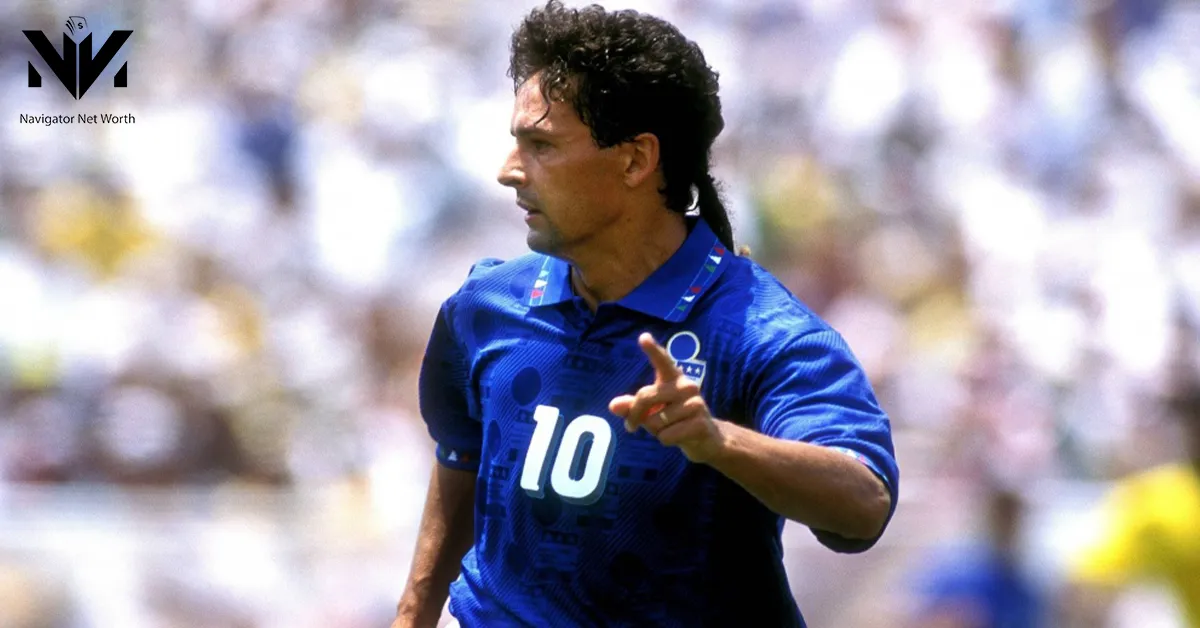
Roberto Baggio Biography
| Aspect | Details |
| Full Name | Roberto Baggio |
| Date of Birth | December 18, 1967 |
| Place of Birth | Caldogno, Italy |
| Nationality | Italian |
| Playing Position | Attacking Midfielder, Second Striker |
| Active Years | 1982-2004 |
| National Team | Italy (1988-2004) |
Roberto Baggio career
Roberto Baggio is a retired Italian professional footballer who played as a forward or midfielder. He is widely considered one of the greatest forwards in Italian football history, and one of the greatest players of all time.
Baggio was born in Caldogno, Italy, in 1967. He began his professional career with Vicenza in 1982, and moved to Fiorentina in 1985. He quickly established himself as one of the best players in Serie A, scoring 27 goals in his first season.
Baggio’s performances with Fiorentina led to him being called up to the Italian national team in 1988. He helped Italy to reach the semi-finals of the 1990 FIFA World Cup, and was named the tournament’s best young player.
In 1990, Baggio moved to Juventus for a world-record fee of £10.5 million. He continued to score goals at a prolific rate, winning the Serie A Golden Boot in 1992-93. He also won the FIFA World Player of the Year award in 1993.
Baggio helped Juventus to reach the UEFA Cup final in 1993, but they were defeated by Parma. He also helped Italy to reach the final of the 1994 FIFA World Cup, but he missed a penalty in the shoot-out as Brazil won the tournament.
Baggio moved to AC Milan in 1995, but he struggled to find the same form he had shown at Juventus. He moved to Bologna in 1997, and then to Inter Milan in 1998.
In 2000, Baggio moved to Brescia, where he enjoyed a successful spell. He helped Brescia to reach the Coppa Italia final in 2001, and he also scored 17 goals in Serie A in 2002-03.
Baggio retired from professional football in 2004. He finished his career with 205 goals in Serie A, making him the seventh-highest scorer of all time.
Baggio is a popular figure in Italy, and he is often referred to as “Il Divin Codino” (The Divine Ponytail). He is known for his elegant playing style, his ability to score goals from anywhere on the pitch, and his trademark ponytail.
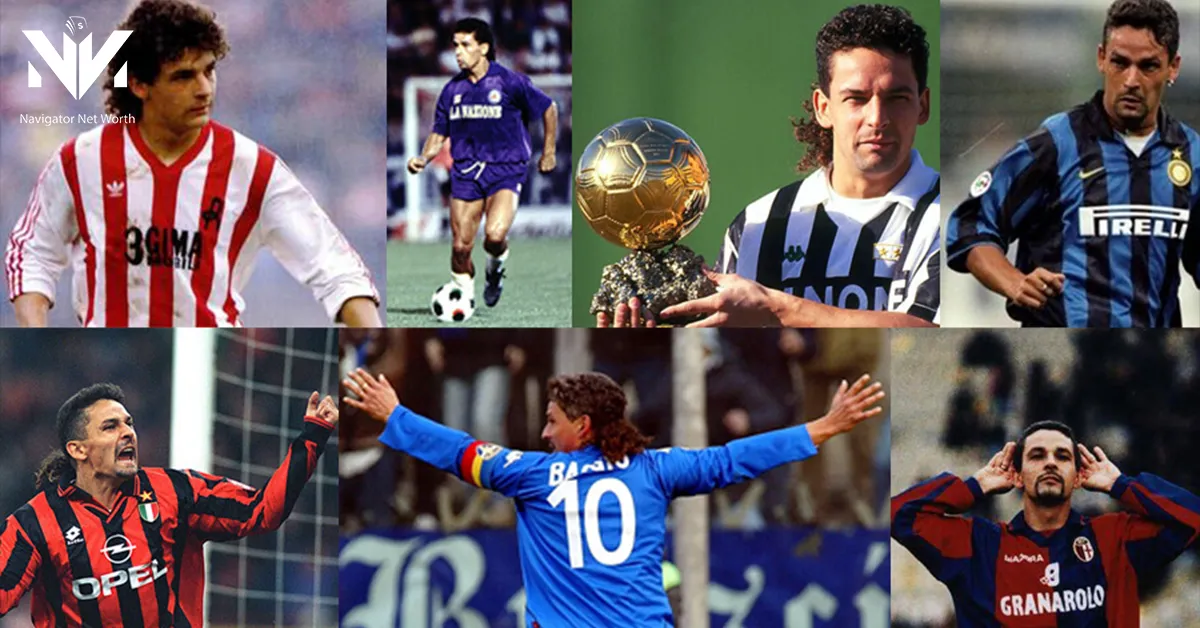
Roberto Baggio career Achievements
| Category | Achievement | Year |
| Individual Awards | Ballon d’Or | 1993 |
| FIFA World Player of the Year | 1993 | |
| FIFA 100 (One of the greatest living players) | 2004 | |
| FIFA World Cup Dream Team | 2002 | |
| World Soccer Player of the Year | 1993 | |
| European Golden Boot | 1997 | |
| Club Level | Serie A Champion (Juventus) | 1995 |
| Serie A Champion (AC Milan) | 1996 | |
| Coppa Italia Winner (Juventus) | 1995 | |
| UEFA Cup Winner (Juventus) | 1993 | |
| Serie A Top Scorer (Fiorentina) | 1990 | |
| Serie A Top Scorer (Juventus) | 1994 | |
| 7th Highest Serie A Goalscorer (205 goals) | – | |
| International Level | World Cup runner-up (Brazil 1994) | 1994 |
| World Cup 3rd Place (USA 1990) | 1990 | |
| World Cup Silver Ball (Brazil 1994) | 1994 | |
| Top scorer for Italy in World Cups (9 goals) | – | |
| Most World Cup appearances for Italy (3 World Cups) | – | |
| European Championship runner-up (Germany 1988) | 1988 | |
| Other | Over 300 career goals | 2002 |
| First player in over 30 years to score 200 Serie A goals | 2004 | |
| Known for his Buddhist beliefs and iconic ponytail | – |
Roberto Baggio Endorsements
Roberto Baggio, the legendary Italian footballer, has been a popular figure for endorsements throughout his career and even after retirement. However, His charisma, talent, and association with some of the biggest brands in the world have made him a valuable asset for companies looking to reach a global audience.
Here are some of the most notable Roberto Baggio endorsements:
- Adidas: Baggio had a long-term partnership with Adidas, wearing their boots throughout his playing career. He was even featured in some of their most iconic advertising campaigns, such as the “Predator” commercial in 1994.
- Pepsi: Baggio was a brand ambassador for Pepsi in the 1990s, appearing in commercials and promotional events. He was also featured on limited-edition Pepsi cans in some countries.
- Kinder: Baggio was the face of Kinder chocolate in Italy for many years. He was a popular choice for children’s products due to his clean-cut image and appeal to young fans.
- Gatorade: Baggio was a spokesperson for Gatorade in the early 2000s. He appeared in commercials promoting the sports drink’s benefits for athletes.
- Audemars Piguet: Baggio is a brand ambassador for the luxury watchmaker Audemars Piguet. He has been seen wearing their watches at red carpet events and other public appearances.
In addition to these major brands, Baggio has also endorsed a number of other products and services throughout his career, including cars, clothing, and video games. He remains a popular choice for endorsements today, thanks to his enduring appeal and global recognition.
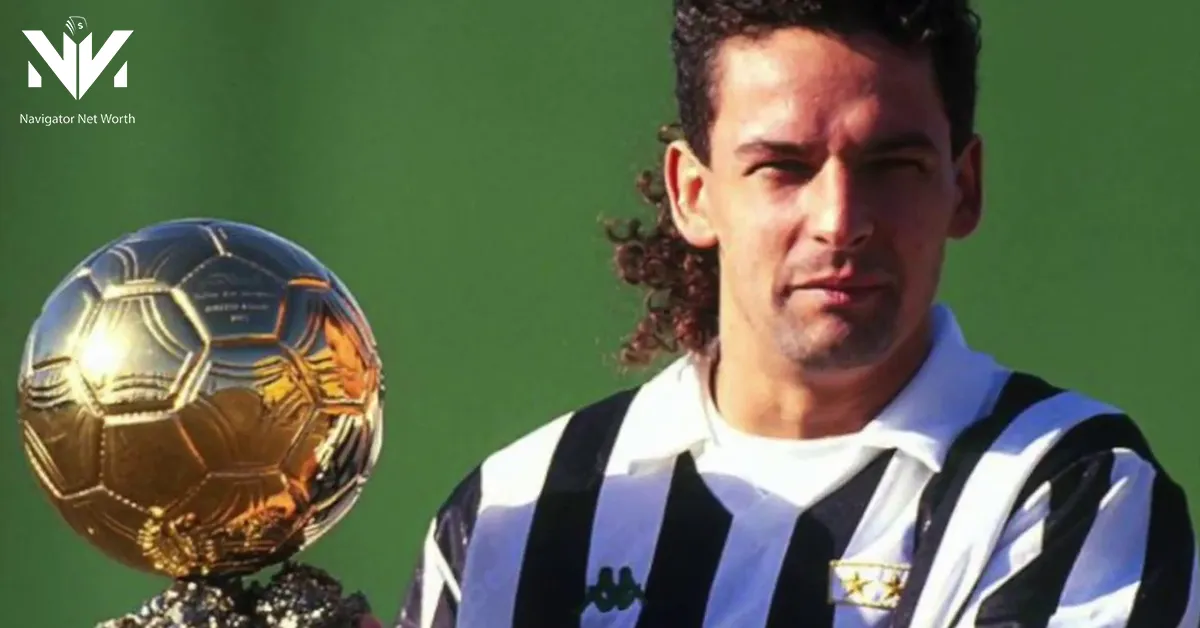
Also check out your Favourite Andrea Pirlo Net Worth in 2024.
Roberto Baggio Investments
Roberto Baggio, the iconic Italian footballer, has kept his personal investments relatively private. However, based on various reports and interviews, here’s what we can gather:
Real Estate:
- He reportedly owns several properties in Italy, including a luxurious villa in his hometown of Caldogno and a vineyard in Tuscany.
Winemaking:
- His passion for winemaking led him to establish the “Azienda Agricola Baggio” in 1998, producing Sangiovese and Merlot wines under the “Divino” label. It seems he actively manages this venture.
Horse Racing:
- Baggio has a lifelong passion for horses and owns a stud farm near Vicenza. He breeds thoroughbreds and participates in races, though details about the extent of his involvement are scarce.
Other Investments:
- There are unconfirmed reports of him investing in restaurants and business ventures related to his hometown or sports interests, but specifics are lacking.
Philanthropy:
- Baggio is known for his charitable efforts, supporting various causes through his own foundation, “Fondazione Sportiva Roberto Baggio.” He focuses on projects related to education, healthcare, and social development, particularly in his hometown.
Overall, while it’s difficult to get a complete picture of Roberto Baggio’s personal investments, it seems he prioritizes ventures close to his heart, like winemaking and horses, while also diversifying into real estate and potentially other industries. He also dedicates significant resources to philanthropy, reflecting his commitment to social good.
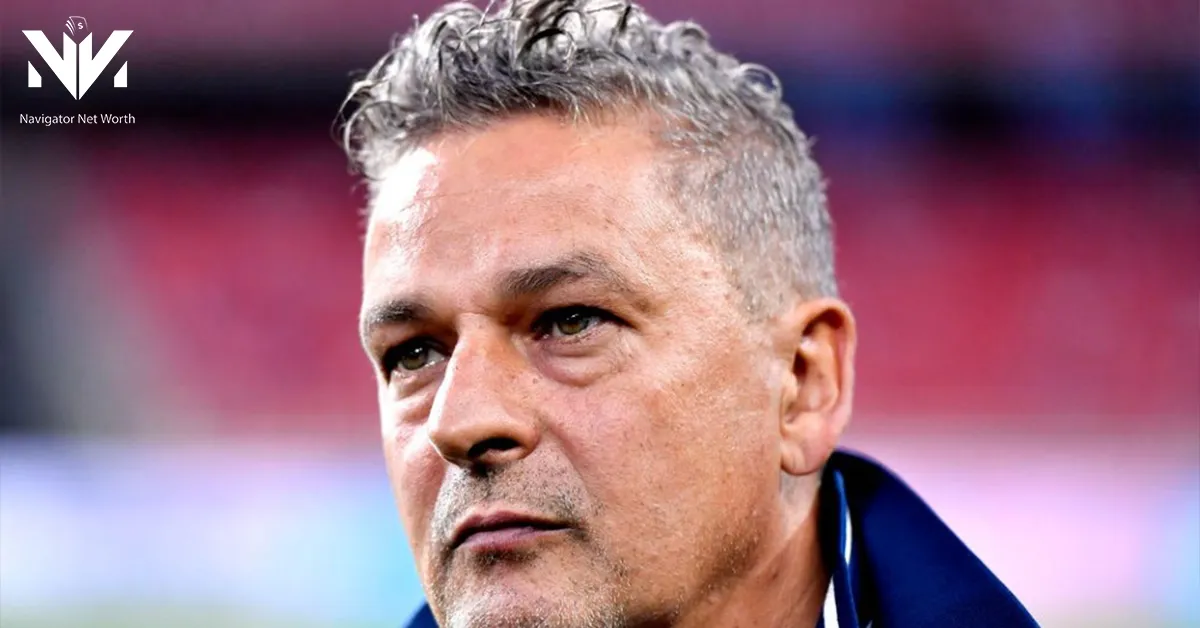
FAQs about Roberto Baggio
1. What is Roberto Baggio’s estimated net worth?
Estimates vary slightly, but Roberto Baggio’s net worth is generally believed to be over £10 million. This figure takes into account his career earnings from playing football, as well as various sponsorship deals and other income sources.
2. How did he earn his money playing football?
Baggio played for several top clubs throughout his career, including Fiorentina, Juventus, AC Milan, and Inter Milan. He commanded high transfer fees and received significant salaries, especially during his peak years.
3. Did he have any significant sponsorship deals?
Yes, Baggio was a popular figure and secured lucrative endorsement deals with brands like Adidas, Puma, and Kellogg’s. These deals contributed significantly to his overall wealth.
4. What are some other sources of his income?
After retiring from professional football, Baggio has remained active in the sport through coaching, philanthropy, and various business ventures. These activities also contribute to his net worth.
5. How does his net worth compare to other footballers?
While Baggio’s net worth is impressive, it falls short of the astronomical figures earned by some of today’s top footballers. However, it’s important to consider the different eras and economic contexts in which they played.

